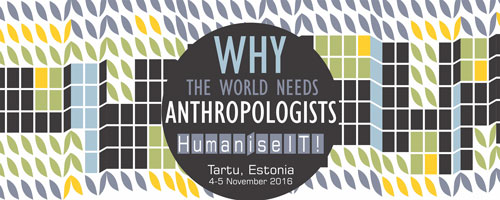Network news
Networks in Milan Conference
During Milan conference, 21 networks organised one or more panels, and 24 organised a meeting. This is a good range of activity that adds to others activities (seminars, congress, meetings, publications) that networks organise at other moments of the year.
The debate with network convenors held in Milan (Networks convenors’ Meeting, July the 22nd 2016) was very rich in exchanges between networks and between networks and members of the executive. Around twenty networks were represented. It was an occasion to share experiences; to consider the ways networks function and the problems they face and see what EASA can do to ameliorate these; to think what other tools could be put in place to help networks in their activities or to consolidate them – considering foundation, output and publications, visibility, technical support, etc.
Networks need to be spaces open to members interested in this or that topic: we should consider them not as permanent organisations but as flexible tools that can change over the time. Showing emerging centres of interest and the shifting of topics, networks are a resource bringing scientific vitality to our association. The Executive is working to reopen the possibility to create networks and to improve the Network rules, bearing in mind that ensuring the maintenance, openness and inclusiveness of existing networks, continue to be the Executive’s main objectives, in a joint effort with network and networks convenors.
Valeria Siniscalchi (EASA Network liaison officer)
News from networks
Teaching Anthropology Network (TAN)
The Teaching Anthropology Network has created a page where you can find information about issues that relate to the teaching of anthropology.
https://www.facebook.com/EASATeaching/
The Network is working creating a TAN logo and publishing a newsletter about the network activities.
Network of Ethnographic Theory (NCAT)
The Network of Ethnographic Theory has a new blog:
https://networkofethnographictheory.wordpress.com
Network for the Anthropology of law, rights and governance (LAW NET)
At the last biennial conference in Milan the networks for the anthropology of law and rights and for the anthropology of international governance decided to merge. Members of both networks agreed that the merger could create synergies and inspire new initiatives exploring themes common to both, the anthropology of law and the anthropology of governance. The new network will provide a platform to all EASA members who are interested in the anthropological study of law and legal institutions, rights discourses and practices of governance. It covers the codified law and specialised agencies of the modern nation-state and the wide range of customary legal and indigenous political institutions that have been studied by anthropologists since the early 20th century. In addition, the network pays particular attention to the transnational and international dimension, especially the anthropology of international organisations, international human rights discourse, international indigenous rights, migration law, and international development.
The network convenors are Gerhard Anders (University of Edinburgh) and Birgit Muller (EHESS).
Peace and Conflict Studies in Anthropology (PACSA)
The Peace and Conflict Studies in Anthropology (PACSA) network is proud to announce that its 6th bi-annual meeting will be held at the University of Amsterdam in the upcoming summer of 2017. Date and theme have yet to be finalised but we encourage everyone interested in convening panels and in participating to stay in touch. Updates and a call for this meeting will be distributed through our email list (http://lists.easaonline.org/listinfo.cgi/pacsa-easaonline.org) and on our Facebook page (https://www.facebook.com/peaceandconflictstudiesinanthropology). What we already know is that we would like to conceptualise panels well in advance as collaborative projects rather than loose conversations, ideally with the goal of producing concrete outputs, such as joint publications, collaborative research projects or applied work with practitioners. But as always, there will also be plenty of space for informal exchange and open debates. We are looking forward to seeing you in Amsterdam, while also looking back at a number of highly successful previous summits convened in partnership with local organisations, such as the Peace Research Institute Frankfurt (PRIF) in 2015.
Applied Anthropology
4th international symposium «Why the World Needs Anthropologists: Humanise IT!», Tartu, Estonia, 4-5 November, 2016
Programme and registration: www.applied-anthropology.com
About the 2016 theme: Information and communication technologies are integral to our world. Engineers, designers, and computer programmers are the inventors and innovators of our time who greatly affect people’s everyday lives – and they need the assistance of anthropology in making human-friendly solutions. The symposium explores how digital designers and anthropologists benefit from each other’s knowledge and approaches. What is the role of culture in technology? How can technology-based thinking be humanised? And how can we get the most out of new technologies for those that use them?
Plenary speakers: Sten Tamkivi (Teleport), Dimitris Dalakoglou (VU University Amsterdam), Melissa Cefkin (Nissan), Daniel Miller (University College London)
Throughout the Day 1, co-organisers and sponsors will present themselves at the Intercultural Hotspot. Do not miss the opportunity to mingle with enthusiasts representing all sorts of different ‘tribes’ - anthropologists, IT experts, marketing specialists, designers, artists.
Day 2 of the symposium is intended for all visitors who are eager to put theory into practice. During five thematic workshops combining insights from anthropology, design, IT industry, art, and marketing, participants will be able to develop prototypes, projects, and campaigns – in just a day!
Workshops on Day 2: Idea Garage: Anthropology Meets Technology (Garage48 Workshop) 2. Humanising Open Data (Antropologerne Workshop) 3. Start Your Own Interdisciplinary Project (DriveGreen Workshop) 4. Crea: Expanding Ethnographic Boundaries by Cross-disciplinary Cooperation with Design and Creative Methods (IADE ID:CO.LAB Workshop)5. Applying Anthropology in the Consultancy Circuit, Step 1: Understanding Your Client and Task (AnthroAnalysis Workshop)
Participation at the event in Tartu is free of charge, however, the number of participants is limited and therefore registration is mandatory. All the workshops have already reached the maximum number of participants, but you can still register to attend the symposium. The (optional) reception and party on Friday evening will cost you €10.







